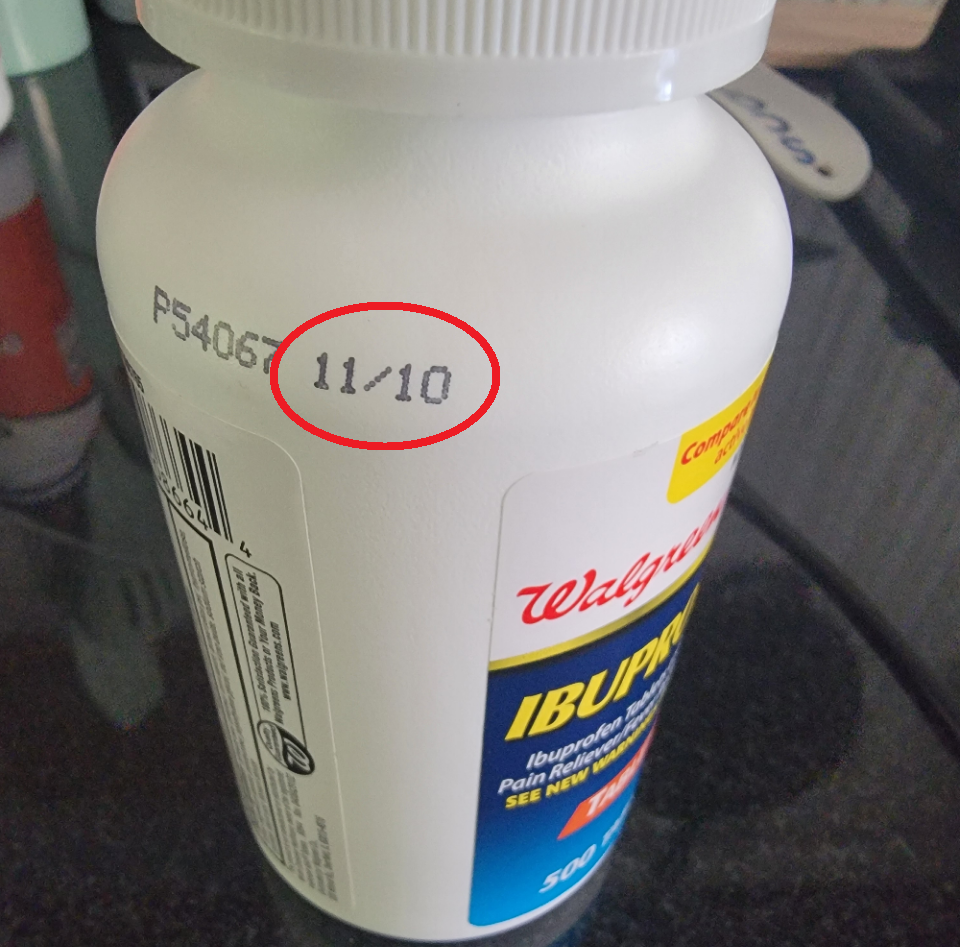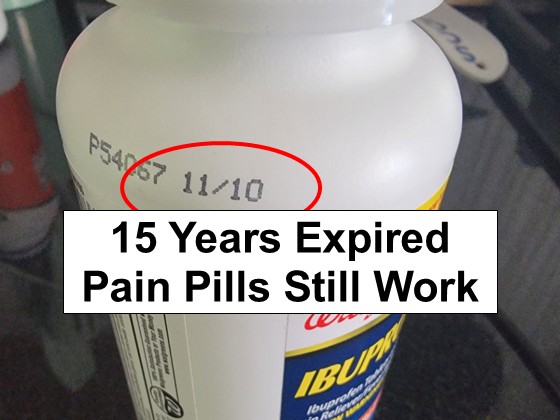My mother-in-law is the queen of saving stuff, especially medications and sometimes foodstuffs that I would’ve tossed a long time ago. This bottle of Ibuprofen is a prime example:

As you can see, the expiration date is stamped November 2010, which is nearly fifteen years ago! My guess is that neither my mother-in-law nor my wife bothered to check before giving it to my sister-in-law who was in town and having some back pain after straining a muscle.
Anyway, the pain pills must still be viable because she used them a few times and found some relief. This isn’t entirely unexpected and has been widely known for decades but it’s the safety that may be of concern:
Under the Shelf Life Extension Program, the FDA tested more than 100 drugs, prescription and over-the-counter, and found that 90 percent of them were safe beyond the expiration date. The drugs were tested by either the manufacturer or the FDA but always with FDA supervision.
Again, 90 out of 100 medications doesn’t mean that your medications are going to safe (as indicated above) or effective long after the expiration date due to factors like heat, moisture, and light exposure, as the article continues:
But consumers shouldn’t assume their expired drugs are still safe and effective because, unlike prescriptions sitting in medicine cabinets, the military’s stockpile has remained sealed in the manufacturer’s original packaging, said Thomas McGinnis, the FDA’s director of pharmacy affairs.
The article concludes that manufacturers are super-conservative with their expiration dates, mostly for profit:
“Manufacturers put expiration dates on for marketing, rather than scientific reasons,” he said. “It’s not profitable for them to have products on a shelf for 10 years. They want turnover.”
Clearly, there’s something to be said for proper storage to increase longevity, as you might expect, but also about the profit motive involved to foster product turnover as with all consumer products. That said, most over-the-counter (OTC) medications are relatively inexpensive, so there’s little harm in replacing them regularly even if you do push the expiration dates a bit.
After a brief search, there are some OTC and prescription medications that probably aren’t safe to use beyond their expirations dates, such as liquid medications (especially liquid antibiotics), aspirin, and insulin as three common drugs Americans use regularly. I found that Tetracycline (an antibiotic) is specifically known to be harmful after expiration, but there may be others. Moreover, drugs that are needed in precise doses to treat a specific condition, like antibiotics, blood thinners, and inhalers to name a few, shouldn’t be messed around with.
This FDA article warns:
Expired medical products can be less effective or risky due to a change in chemical composition or a decrease in strength. Certain expired medications are at risk of bacterial growth and sub-potent antibiotics can fail to treat infections, leading to more serious illnesses and antibiotic resistance. Once the expiration date has passed there is no guarantee that the medicine will be safe and effective. If your medicine has expired, do not use it.
I’d say that by now most people know about the problem with expired antibiotics possibly leading to a more serious infection, but I’ll bet most didn’t now about bacterial growth (me included) or that some expired meds may be “risky” due to a change in chemical composition.
Generally speaking, medical advice leans toward: “use it if you must, but replace as soon as possible” as this article discusses:
The vast majority of over-the-counter medications retain stability and potency well beyond the listed expiration date. When used for minor aches and pains or allergies, it is fine to use an over-the-counter medicine that expired a couple months ago until you can replace it. For those taking a physician-recommended daily aspirin for heart health, the expired pills should be replaced as soon as possible. Again, this is a case where it is probably better to take potentially sub-potent expired medicine versus nothing until the expired medication can be replaced.
In my opinion, however, using an OTC medication fifteen years after the expiration date is just too much. Yes, the Ibuprofen seems to have worked. And it didn’t cause any ill effects that we noticed. But, c’mon … let’s not take any chances!
Please replace your medications regularly.

Leave a Reply